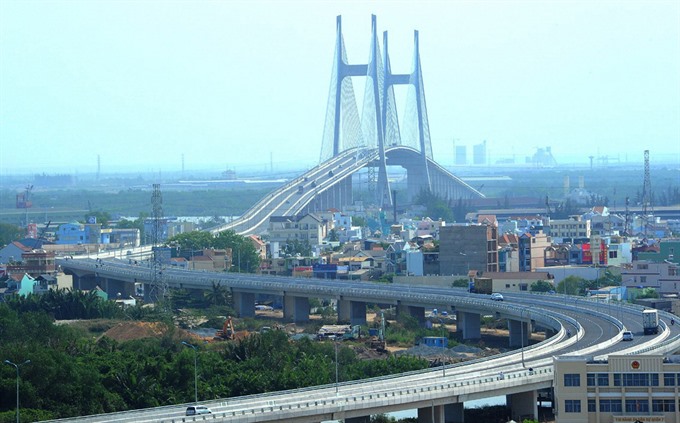 Society
Society

The Government has issued a decree that offers HCM City special financial and budgetary policies and incentives in an aim to improve its infrastructure.
 |
| HCM City’s Phú Mỹ Bridge - the biggest cable-suspension bridge over the Sài Gòn River. — VNA/VNS Photo Kim Phương |
HCM CITY — The Government has issued a decree that offers HCM City special financial and budgetary policies and incentives in an aim to improve its infrastructure.
The government decree, which takes effect next month, gives priority to investment in infrastructure development in order to maintain the city’s status as the country’s economic hub.
Under the decree, the city will be eligible to receive advance payments from the state and lending sources to hold auctions of land-use rights, after which the city will refund the state and repay the loans.
The Government has also prioritised Official Development Assistance (ODA) funds and preferential capital sources for projects related to urban infrastructure and the environment.
In addition, HCM City will be allowed to mobilise investment from public-private partnerships (PPP) and other public-private funding models.
Lending sources
The city needs a VNĐ500 trillion (US$23.5 billion) to invest in urban infrastructure between now and 2021, and a similar amount for the next five-year period, according to the HCM City Finance and Investment Company (HFIC).
Because of the enormous need for capital, the city has no choice but to take advantage of new incentives to generate investment from private sources, according to experts.
They noted that many local residents keep their money outside banks or in the form of gold or foreign currency, particularly US dollars.
Gold reserves kept at home are estimated at 400-500 tonnes, equivalent to $17-21 billion, according to the Việt Nam Gold Business Association.
In terms of foreign exchange, the annual rate of remittance growth now averages 16 per cent. At this rate, by 2020, remittances could reach more than $28 billion.
Ninety per cent of remittances are used for savings, investment in gold, real estate, or business production.
The remaining 10 per cent of remittances, or around $9.7 billion, are assumed to be kept at home by residents.
Economists said the large amount of foreign currency held by residents is far greater than official data.
If such resources were properly exploited, policymakers would be more able to address the lack of capital for urban infrastructure, they said.
Economists have also said that the city should be allowed to expand the collection base via a number of special revenue sources based on specific conditions.
In addition, tax revenue could be expanded by new tax rates set by the city, in accordance with national law.
Experts have also said the government could give HCM City a bonus if its tax collections exceeded expectations.
The city plays an important role in providing a number of complex services on a large scale, much higher than in other areas in the country.
Thus, economists believe the city should have more autonomy to regulate expenditures and spending in accordance with its needs, with priority given to new construction and renovation and infrastructure development. — VNS




